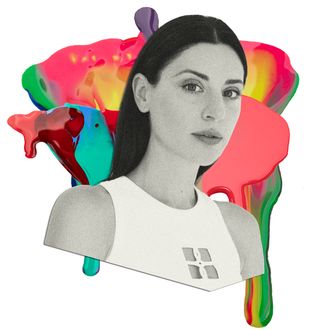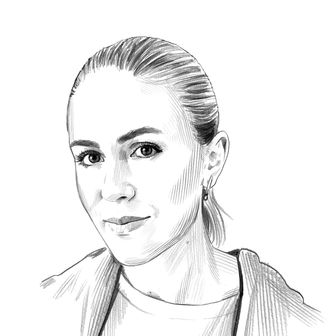
Svitlana Bevza founded her namesake fashion label in 2006 out of a small atelier in Kyiv. She was 24 years old and fresh out of college with a few pattern-design courses under belt and an economics degree to appease her parents. “I made a bet with one of my friends that she had to open a restaurant in two months and I had to design my first collection in two months,” she says. “I went to the bank and they gave me a small credit. All I had was a couple of sewing machines, but we both managed to do it.”
Bevza’s clothes were functional, but they were also sleek, sensual, and elegant with subtle motifs that pay homage to her Ukrainian heritage. Her vision resonated with consumers across Ukraine and soon gained international attention. She made her New York Fashion Week debut in 2019; by 2023, she’d scored a coveted invite to the Met Gala from none other than Balenciaga’s Demna. Behind the scenes, the designer has been navigating the war in Ukraine since Russia invaded in 2022. “I watched Putin’s speech on TV and thought there would be some provocations or protests. But what I woke up to was explosions,” she says. “It started in Kyiv, where I live, so we were all in shelters or basements for about a month and a half. We had a team check-in every morning to make sure everyone was okay.” Most of the Bevza team stayed in Kyiv, but the designer made the decision to relocate — first to Portugal and then to London — with her two children, ages 10 and 6. (Since men are not permitted to leave Ukraine, she was forced to leave her husband behind).
Bevza’s next big project is the spring/summer 2025 collection exhibition, held on September 7 during New York Fashion Week. Here’s how she gets it done.
On how Bevza weathered the outbreak of war:
My team in Kyiv started messaging me saying they didn’t want to just sit and wait for who knows what. They wanted to figure out ways to continue working, because doing nothing made them more stressed. They are also very passionate about their jobs. We had numerous talks about relocating the team, but it’s a paradox. They don’t want to leave, especially people who are not married or have grown children.
Access to our warehouse in Kyiv was blocked, so we couldn’t even send our spring/summer collection to buyers. But we still had access to our office and it’s near a subway station. We had some stock there, including our signature spikelet, so we started an E-commerce business. We posted a message on Instagram saying that we would be selling for an unknown period of time, and we’ve been doing that ever since. We learned how to be as flexible as possible during this period. We had huge support from our international buyers. They messaged us and said they know what’s going on and they can wait. None of them canceled their orders.
I also went to Portugal to search for new production sites. I spent a year there with my kids. We opened a second warehouse in Europe. The factories in Ukraine eventually started to re-open, so now we operate out of both warehouses.
On dealing with fear and uncertainty:
I had no choice. I left the country with two small children. And honestly, the first few months were really bad. I always thought of myself as a strong person who handles stress well, but my brain couldn’t grasp the fact that I was witnessing this war in the 21st century. I mean, we had everything established. We had a nice house in the suburbs, a swimming pool, a good school for the kids, a nice office, and a job I love. Then in one moment, everything changed. It was like a bad movie: Two kids, one suitcase, and I just had to go.
On what motivates her:
My team and I motivate each other. I remember an employee that makes handmade jackets called me once because the lights went out. She had to wake up at 5 a.m. and sit by the window and do her job until the sun went down, and she actually thanked me for giving her the opportunity to work. There are no lights in her apartment, but she is happy. I feel a huge responsibility for all the people who work with me. I feel a sense of responsibility to our Ukrainian fashion community, because Bevza is one of the most established Ukrainian brands. We represent our country at international markets. I want to share our culture and values and show people that we are not — and have never been — a part of Russia, culturally. Anger also motivates me. I was very angry when the war started because we didn’t invade Russia. We didn’t do anything, but they want to take something that’s mine.
On managing stress:
I sit alone in silence. I’m always working at a high speed, but this is half an hour of doing nothing. Literally nothing. I sit and breathe. It’s the best thing for me.
On what she wishes she would’ve done differently at the beginning of her career:
If I had a chance to study abroad, maybe my career would’ve started differently. I would’ve learned how to deal with the international fashion community earlier. For instance, maybe if I had gone to New York Fashion Week earlier, I would’ve had more exposure. But we never know, we can only suggest how it would’ve happened. At the same time, the Bevza style was probably developed because of my environment. I didn’t grow up in New York or Paris. I’m not a British designer. Maybe my aesthetic was attractive because it was something different.
On her morning routine:
First I have to manage my kids’ schedule. In the summer, it’s hard, but when they have school, I wake up at 6:30. It’s the perfect time because everybody is still sleeping. I just drink water when I wake up, then I shower and think about the upcoming day. I make breakfast and walk the kids to school. I bought my first pair of Wellingtons here in London. I feel really fancy wearing them in the morning. That’s sort of the dress code for parents: raincoat, leggings, and Hunter boots. Then I get my morning coffee at Gail’s on the way home. If the weather is good, I run back to my apartment at 9 am, London time. It’s already 11 a.m. in Kyiv, so sometimes we have some urgent calls. I try not to touch my phone before breakfast. If I do, I will just start working right away. So for me, there are some basic laws of routine: good sleep, good food three times per day, and no touching the phone in the morning.
On what she’s reading:
My friend recommended Atomic Habits. I’m reading it very slowly and carefully. I like what it says about the two-minute rule, which is that if you start a new habit, it should take two minutes to do. The brain doesn’t think that it’s something difficult if you only do it for two minutes. I’m also reading Front Row by Lisa Armstrong. It’s really funny, I like how she writes.
On her evening routine:
The kids are done with school at 3:30. They have after-school clubs, mathematics, English tutors because British English is different from what they learned in Ukraine, ballet classes, drawing classes. If I’m lucky, I get 30 minutes of silence and don’t-touch-mommy time in my room. I prepare dinner. And most important is sleep. I keep a sleep regimen, even during the holidays, so that when school starts, they are prepared to get up early and go to bed early at 9 pm.
On the people who help her get it done:
I always say I’m very organized and I don’t need a personal assistant. My team literally laughs at me. They always remind me about things I cannot miss. I get too much information and too many different tasks, so they all have to help me with my schedule. I really should have a personal assistant. But we work with a nanny from Ukraine named Julia. She really helps me a lot because I can do my office calls while the kids are being entertained.
On balancing work and motherhood:
When my son was three and finally went to school, I decided I was ready to take a risk. I applied for New York Fashion Week and got accepted. I didn’t know it yet but I was already pregnant with my second child by the time I did the show. But I never missed seasons. When I was six months pregnant, I flew to New York again for the second show of the year. It was difficult, when you have small kids who physically need you. Now that they’re older, it’s a bit easier.
I started Bevza long before I got married and long before I had kids, so it’s my first baby. I should let go and give more tasks to the team, but I’m still very involved. My daughter says she wants to be like me. I don’t even talk much about fashion with her, but it comes very naturally to her. She’ll come to my room and help me with styling. She does it nicely. I like her color combinations and she drapes clothing in a really interesting way. She’s good! I have all the photos in an album on my phone because one day I think I’ll create a capsule collection inspired by her style.





